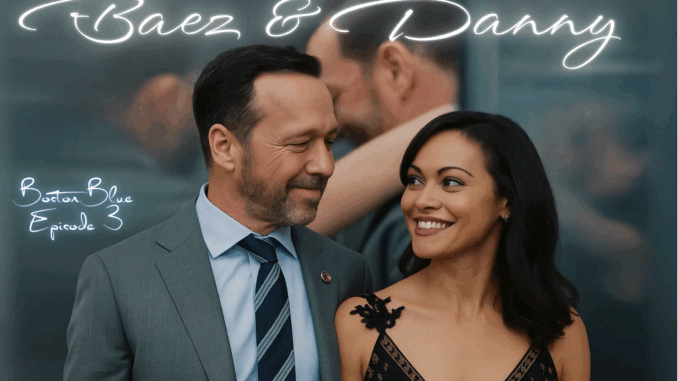
When CBS announced that Marisa Ramirez would officially return as Detective Maria Baez in Boston Blue, fans of the Blue Bloods universe collectively exhaled in relief. Her chemistry with Donnie Wahlberg’s Danny Reagan had long been one of the emotional anchors of the original series — a slow-burning connection defined by mutual trust, grief, and loyalty rather than overt romance. But in Boston Blue, that dynamic finally shifts. The question isn’t if Danny and Baez care about each other — it’s how far they’re willing to let that affection evolve.
From the moment Ramirez steps back into the frame, her presence feels like an emotional homecoming. The series, set in Wahlberg’s real-life hometown of Boston, carries a distinctly different tone — more grounded, more personal, and more introspective than Blue Bloods. Yet amid this change in scenery, Baez’s reappearance re-centers Danny’s story. She’s a living reminder of his past — a tether to his New York roots, to partnership, and to the parts of himself that haven’t yet been hardened by grief or isolation.
The showrunner, Mitchell Burgess, teased that Baez’s role in Boston Blue would “challenge Danny in ways we’ve never seen.” That promise becomes evident almost immediately. Where Danny’s Boston colleagues are blunt, procedural, and wary of his unorthodox methods, Baez understands him instinctively. Their first on-screen reunion in Boston Blue is quiet but loaded with subtext: a shared glance, a half-smile, and an almost imperceptible sigh of relief. It’s not a grand romantic confession, but something far deeper — two people realizing they’ve been missing the piece that makes them whole.
In interviews, Ramirez admitted she was nervous to reprise Baez after the emotional closure of Blue Bloods Season 14. “We left her in such a grounded place,” she explained. “I wanted to make sure that bringing her back felt honest.” Honesty, in fact, defines her performance in Boston Blue. Her Baez is more mature, more self-aware. She no longer hides her feelings behind professionalism; she confronts them with courage. This evolution gives the series a fresh emotional spine — not a love story built on flirtation, but one built on earned trust and shared trauma.
For fans who followed their journey from wary colleagues to confidants, this new phase feels both inevitable and cathartic. Danny, still haunted by the loss of his wife Linda, spent years resisting emotional vulnerability. Baez’s return doesn’t erase that pain — it redefines it. Instead of serving as a romantic “replacement,” she becomes a bridge between Danny’s grief and his future. When she tells him, “You don’t have to do this alone anymore,” it’s not just a line — it’s a promise of healing.
Narratively, Boston Blue uses their relationship to explore a larger theme: what it means to move forward without forgetting where you came from. The show’s Boston setting isn’t just a backdrop — it’s symbolic of new beginnings built atop old wounds. Danny’s return to his hometown mirrors his emotional journey, and Baez’s arrival forces him to confront the tension between comfort and growth. In one pivotal scene, Danny admits that seeing her in Boston “feels wrong but right at the same time” — an acknowledgment of both nostalgia and the courage to evolve.
Critics have praised Boston Blue for walking the fine line between continuity and innovation. While the show borrows the moral depth and family focus that defined Blue Bloods, it allows its characters to breathe in new ways. The Danny–Baez relationship exemplifies that balance. Instead of the usual “will they/won’t they” trope, the writers treat their bond as something organic, rooted in shared experience rather than contrived drama. Their connection isn’t defined by physical intimacy, but by emotional synchronization — two people who’ve learned to read each other’s silences.
Online, fans have embraced this direction. Social media threads are filled with comments like “Finally, they’re letting Danny be happy again” and “Baez deserved this storyline years ago.” The enthusiasm reflects how deeply invested viewers are in these characters — not as archetypes, but as evolving human beings. It also underscores the power of long-form storytelling: relationships that simmer for over a decade carry a weight that quick, flashy romances can’t replicate.
Still, Boston Blue doesn’t rush their arc. By Episode 5, the two remain careful, aware of the risks — professionally and emotionally. But the undercurrent is unmistakable. The way Danny softens when Baez enters a room, the way she steadies him with a single look, the unspoken comfort between them — all signal that their connection has transcended partnership. Whether or not it ever becomes explicitly romantic, their relationship is already one of television’s most mature portrayals of love: quiet, steadfast, and built on years of shared resilience.
Donnie Wahlberg has hinted that this new chapter will challenge both characters to “balance duty and desire.” That tension feels authentic to who they are. Both are defined by loyalty — to the badge, to justice, and to each other. In Boston Blue, that loyalty becomes both their strength and their test. The more they open up emotionally, the more they risk losing the professional armor that has protected them for years. It’s the kind of internal conflict that gives the show its depth — and keeps audiences coming back.
Ultimately, Marisa Ramirez’s return isn’t just a nostalgic callback — it’s a statement. Boston Blue refuses to treat emotional connection as a subplot. It places it at the center of the narrative, acknowledging that even in a world of crime and chaos, the most enduring battles are the ones fought inside the heart. For Danny and Baez, the heat isn’t about passion alone — it’s about persistence, compassion, and the courage to finally let someone in after years of standing guard.
With Wahlberg and Ramirez back together, Boston Blue finds its pulse — and perhaps, its soul.